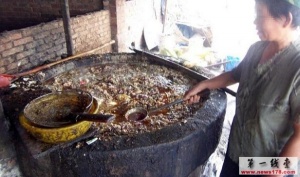“Ditch oil”的版本间的差异
来自China Digital Space
| 第8行: | 第8行: | ||
<blockquote>''Yifushitang'' (@一夫食堂): Since using '''ditch oil''' also incurs costs, why not add a little less? It's not easy eating out. (May 25, 2015)</blockquote> | <blockquote>''Yifushitang'' (@一夫食堂): Since using '''ditch oil''' also incurs costs, why not add a little less? It's not easy eating out. (May 25, 2015)</blockquote> | ||
| − | 即使'''地沟油'''也要成本呀,能不能少放点儿,出门在外吃饭真是不容易。[[http://www.weibo.com/1780481403/Cjum1cHLG?type=comment#_rnd1432792135540 '''Chinese''']] | + | <blockquote>即使'''地沟油'''也要成本呀,能不能少放点儿,出门在外吃饭真是不容易。[[http://www.weibo.com/1780481403/Cjum1cHLG?type=comment#_rnd1432792135540 '''Chinese''']]</blockquote> |
[[Category: Grass-Mud Horse Lexicon]] | [[Category: Grass-Mud Horse Lexicon]] | ||
2015年5月28日 (四) 20:06的版本
地沟油 (dìgōu yóu): ditch oil

Cooking oil “refined” from the leftover food that people and restaurants throw away, also known as “gutter oil.” The leftovers are usually fed to pigs, but some unscrupulous people will gather the slop and “recycle” it by selling it as low-cost cooking oil. Refining ditch oil is illegal because of its negative health effects; it can be carcinogenic and contain hazardous chemicals.
Ditch oil first became a topic of major concern in 2010, when authorities revealed that up to one-tenth of cooking oil used in China might actually be ditch oil. Ongoing investigations have shown that ditch oil is widely used. Ditch oil is now a symbol of China’s ongoing food safety issues. A 2012 study by the Pew Research Center found that 41% of Chinese considered food safety a very big problem for the country, up from just 12% in 2008.
Example:
Yifushitang (@一夫食堂): Since using ditch oil also incurs costs, why not add a little less? It's not easy eating out. (May 25, 2015)
即使地沟油也要成本呀,能不能少放点儿,出门在外吃饭真是不容易。[Chinese]




